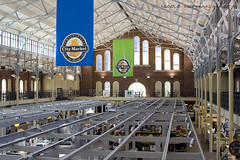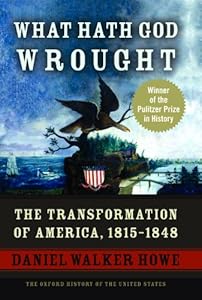Daniel Walker Howe, from the department of history at UCLA and Oxford University (and recent Pulitzer prize winning writer of What Hath God Wrought: The Transformation of America, 1815-1848 (Oxford History of the United States) provided a historical overview of the reversals among Evangelicals and the way in which they are related to the Republican party.
Howe reminded the group that Evangelicalism was a dominant, organized, and transformative influence in American society in the early 19th century.
Yes, Higher criticism and the intellectual winning over of Darwinism in the early 20th Century effectively split American Protestantism between those that accommodated these approaches and those that rejected them. But until that time, Evangelicals affiliated with the state, supported strong government to provide education and strong structure and tariff protection as well as temperance legislation against liquor.
For Howe, the repeal of prohibition in the early 20th Century turned Evangelicals against the state. That’s when Evangelicalism became “conservative.”
Mark Silk from the department of religion at Trinity College came out strongly against interdisciplinarity, yet spent much of his time talking about the religious narrative of “religious nones.” He speculates that the research that found a doubling of the proportion of “nones” in American society gained so much attention because it runs counter to our new understanding of the post-9/11 world which has raised the level of religious awareness and discourse to extremely high levels.
 Indianapolis City Market nicolernorman Flickr
Indianapolis City Market nicolernorman Flickr
Answer: Hmmm, well... there's a great deal of ambiguity. Silk says there is much more research desperately needed to tease out the implications of this emergent, yet unclear, category of analysis.
Winnifred Fallers Sullivan, a very interesting and very articulate professor from the University at Buffalo Law School, spoke persuasively about the difficulty of being a “scholar” of religion.
“It’s not that there is no religion in the academy,” she said, “but that it is everywhere, and that we have no control of how religion is discussed.”
As a legal scholar, she consistently finds that the fact she has a religious studies degree doesn’t matter, it does not lend any particular weight to her opinions. All Americans talk about religion. Anybody can talk about religion. The most important aspect of this for scholars is that it is difficult to help the general public appreciate that there is need for a level of expertise to talk about religion today.
She asserts that it’s not that the study of religion is not important to people, but rather that the study of religion requires training.




No comments:
Post a Comment